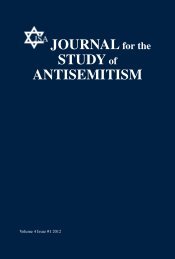JOURNALfor the STUDYof ANTISEMITISM
JOURNALfor the STUDYof ANTISEMITISM
JOURNALfor the STUDYof ANTISEMITISM
Create successful ePaper yourself
Turn your PDF publications into a flip-book with our unique Google optimized e-Paper software.
Latin America and <strong>the</strong> Middle East:<br />
The Political Background<br />
Julián Schvindlerman*<br />
Latin America does not have a geostrategic weight hitting strongly globally.<br />
With <strong>the</strong> exception of Brazil, it can leave its mark in <strong>the</strong> international<br />
community through votes. In <strong>the</strong> Western hemisphere, however,<br />
Latin America strives to expand its ideologies, to receive problematic<br />
countries and questioned groupings, and to affect <strong>the</strong> political climate and<br />
regional security. Latin America contains very different ideologies, and<br />
its destiny will depend much on <strong>the</strong> direction that, collectively, <strong>the</strong>ir<br />
inhabitants permit <strong>the</strong>ir leaders to give.<br />
Key Words: Latin America, Antisemitism, Hizbullah, Jews, Arabs, Iran<br />
Throughout Latin America, <strong>the</strong> flood of participation in oriental subjects<br />
was recently in evidence with <strong>the</strong> several expressions of formal support<br />
granted by all South America, minus Colombia, to a possible unilateral<br />
declaration of a Palestinian state. Brazil, by surprise, started up <strong>the</strong> response<br />
to a Palestinian key interest in obtaining formal recognition to a hypo<strong>the</strong>tical<br />
reality that arose like fruit out of <strong>the</strong> bilateral negotiations. “I always<br />
have <strong>the</strong> hope of having <strong>the</strong> best form to solve <strong>the</strong> problems between <strong>the</strong><br />
negotiating countries,” said <strong>the</strong> Argentine chancellor, Héctor Timerman,<br />
when explaining his justification for taking an action—facilitating <strong>the</strong><br />
attainment of a political objective for <strong>the</strong> Palestine Authority but eluding<br />
<strong>the</strong> dialogue with <strong>the</strong> government of Israel—that in fact caused <strong>the</strong><br />
opposite.<br />
Although <strong>the</strong> diverse official notices varied in some degree in <strong>the</strong>ir<br />
content—essentially about <strong>the</strong> stipulation of <strong>the</strong> final borders of <strong>the</strong><br />
future—<strong>the</strong> certain thing is that altoge<strong>the</strong>r <strong>the</strong>y constituted an important<br />
Latin American endorsement of <strong>the</strong> Palestine diplomacy. For February initially,<br />
soon delayed until March or April, and finally postponed indefinitely<br />
due to <strong>the</strong> massive protests in <strong>the</strong> Arab world, <strong>the</strong> Summit of Government<br />
and Chiefs of State was due to be held in Lima III of <strong>the</strong> America Forum of<br />
<strong>the</strong> Arab South-Countries (ASPA), where it was considered a collective<br />
expression of recognition of <strong>the</strong> Palestinian state. By <strong>the</strong> end of March, a<br />
meeting under <strong>the</strong> auspices of <strong>the</strong> UN “in support of La Paz Palestinian-<br />
Israeli,” attended by delegates of Latin America and <strong>the</strong> Caribbean,<br />
occurred in Montevideo, in which Palestinian representatives announced<br />
51














